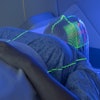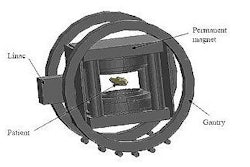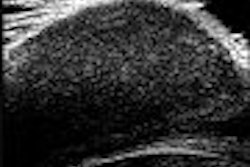
TAT is based upon the unique ionization characteristics of alpha particles. "Alpha radiation has the important advantage of high-energy transfer to targeted cancer cells over a short range of several cell diameters," the team explained in Physics in Medicine and Biology (July 7, 2007, Vol. 52:13, pp. L15-19).
As a result, alpha radiation is great at killing surrounding cancer cells while sparing nearby healthy tissue, though to be effective the alpha source needs to be right next to the cancer cells.
Researchers can achieve this proximity by injecting patients with a solution containing an alpha-immunoconjugate (AIC), a molecule made up of a cancer-specific antibody labelled with an alpha-emitting radioisotope. This antibody is drawn to receptors expressed only by cancerous cells, so that the AIC collects in the diseased tissue.
Until recently it was thought that TAT was suitable only for destroying isolated cancer cells and small preangiogenic cell clusters, chiefly because the short range of alpha radiation means it cannot penetrate far into solid tumors. This idea has now been called into question, however, thanks to the results obtained by the team from St. George Hospital and the St. George Clinical School at the University of New South Wales, both in Kogarah.
During an ongoing phase I trial of systemic TAT for metastatic melanoma, the researchers noticed that some of the patients' solid tumors showed major regression.
"The observation of partial or complete tumor regressions in some patients was unexpected, as TAT is not at all indicated for solid tumors," the team wrote. To explain these strange results, they have postulated a new therapeutic mechanism, dubbed tumour anti-vascular alpha therapy (TAVAT).
TAVAT hinges on the fact that tumors have vasculature that is structurally and functionally abnormal. The endothelial cells that make up the walls of tumor capillaries are malformed and don't join together properly, leaving gaps large enough for molecules such as AICs to pass through. These capillaries are enclosed by cells known as pericytes, which express the same antigen as melanoma cells.
All these factors combine to produce a situation in which the AIC can escape from the bloodstream and gather around the pericytes and contiguous melanoma cells. From here, the emitted alpha particles can readily kill surrounding endothelial cells, which results in the capillary closing and nutritional support to the tumor shutting down. If enough capillaries are closed down, the tumor will regress and completely disappear.
"TAVAT would work for all cancers with solid tumors," explained lead researcher Barry Allen, s professor of experimental radiation oncology at St. George Hospital. "All tumor capillaries are leaky to some extent, and the extent of the leakiness determines the success of TAVAT."
Allen suggested that the effect could potentially form the basis of a new type of cancer therapy. "Only alpha particles have the path length and rate of energy loss to effectively kill endothelial cells," he said. Treating other types of cancer, however, would require designing conjugates with antibodies targeted to both the cancer cells and pericytes, as melanoma is the only case in which both types of cell express the same antigen.
The researchers now need to go back into the laboratory and conduct preclinical studies of the effect. "TAVAT has been observed in human subjects, but not in mice," Allen said. "We will now try to reproduce this effect in mice so that quantitative studies can be made."
By Michelle Jeandron
Medicalphysicsweb science and technology reporter
September 28, 2007
Related Reading
Adjuvant therapy for aggressive squamous cell carcinoma found ineffective, June 14, 2007
© IOP Publishing Limited. Republished with permission from medicalphysicsweb, a community Web site covering fundamental research and emerging technologies in medical imaging and radiation therapy.



















